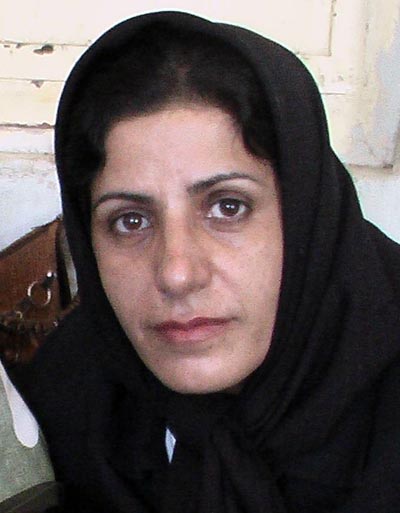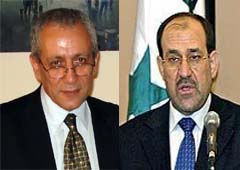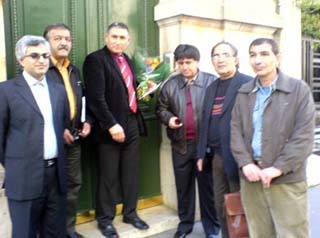UPI reported on May 16, that more than 180 members of the British Parliament have signed a letter proposing that the Obama administration change its stance on Iranian opposition movements as part its new policy of engagement. "Our experience has shown that the Iran crisis cannot be resolved without an Iranian solution and without relying on its main opposition movement," the letter said.
This lobbying activity to promote the Mojahedin-e Khalq is part of a coordinated Europe-wide action to rescue the MKO; although a resolution pushed through the European Parliament by the MKO’s promoters there has already been watered down to nothing by opponents.
The response of the Islamic Republic of Iran to the MKO’s western promoters is unequivocal; the MKO is a “used card” and the Government of Iran will not pay a penny for them no matter how the group is used by western powers to threaten or cajole.
This posturing from both sides demands a response only because both sides are using MKO members as pawns to win political points in total disregard to their actual situation.
In fact it could be said that the MKO is not a ‘burned card’. The group clearly has a lot of use left in it for both sides. Unfortunately in the real politics of Iran and the west the MKO is the wrong card. By doggedly hanging on to the MKO western players are trying to trump an ace with a Joker. (The Iranian ace being that the existence of the ‘terrorist’ MKO allows the IRI to point to the double-standards in the western approach to terrorism.)
In this ‘game’ it must be understood clearly that the MKO is not a problem for Iran. Instead it is a very real problem for Iraq. MKO promoters have already shown a remarkable unwarranted animosity and arrogance toward the Government of Iraq in challenging its decision to close Camp Ashraf and remove MKO members from the country.
So, do western players really only have a Joker to play?
Perhaps before all else it would benefit both sides of this ‘game’ to appreciate that former members who try to expose the true nature of the group bear no animosity or enmity toward their former colleagues. Rather they regard them with gut-wrenching pity; pity for their current suffering under the crushing daily mind-control regime, pity for the fact that they are not normal people anymore and pity because of the years of their lives which they have lost for nothing.
The MKO’s western promoters want the MKO removed from the US terrorism list. To back this up, their insistence that the MKO no longer believes in violence to achieve its aims can easily be proved by cooperating with the Government of Iraq to remove everyone from Camp Ashraf and bring them to safety in Europe. The continued refusal to offer this help signals a very different agenda, one which is not lost on those who have experienced first-hand the MKO’s belief in violence, the Iraqi people.
It would certainly profit the MKO’s western promoters to take a step back and really look at how ordinary Iranians, inside and outside Iran, regard this group. I suggest this, not because they don’t already know the answer – that ordinary Iranians, almost without exception, either fear, revile or deride the group – but because of the implications of that opinion.
Perception, like reputation, is very hard to correct once it is warped or damaged. With the expenses scandal in the House of Commons and the cash for questions scandal in the House of Lords, British parliamentarians have a very hard task ahead to repair their reputations. Similarly, when protestors burned an effigy of Foreign Minister David Miliband for perceived support of the Tamil Tigers in Sri Lanka, British parliamentarians should take note of what the perception of ordinary Iranians must be when they support the MKO and try to foist a destructive cult on them as the ‘main opposition group’.
When British parliamentarians give their support to such an infamous group, the perception can only be that parliamentary democracy in the UK is open to abuse, whether because political support can be bought or whether it can be got by deception.
Coupled with the recently exposed reputation for ‘dishonesty’, parliamentarians need to recognise that the perception of their support for this defunct group is such that it can only be because of some personal benefit of their own. Certainly there is no benefit for British foreign policy, nor for the Iranian people and especially not for the real victims of the MKO, its own members.
By Anne Singleton



 through different means. He could get some youth away from their homes. They were innocent young individuals whose natural right was to live a normal life, but MKO could deceive them to join the group. I remember that at the time each person needed 30 thousand Tomans (roughly 30 American Dollars) to flee from Iran. The organization recruited those who were out of job or those who had other problems and sent them out of the country through various ways. There were also individuals who were introduced to the organization. For instance my husband was introduced by a member who had already joined the group. Then the organization sent a guy to recruit him in Iran and sent him abroad. There were some smugglers who took the recruited ones passing the borders and the journey was very dangerous. But it didn’t matter to Rajavi. When the organization tricked my husband and me, we were supposed to join MKO’s courier. We got out of Iran on camels. We risked our lives so many times but finally we could survive. I remember a lot of young couples were killed in the way.
through different means. He could get some youth away from their homes. They were innocent young individuals whose natural right was to live a normal life, but MKO could deceive them to join the group. I remember that at the time each person needed 30 thousand Tomans (roughly 30 American Dollars) to flee from Iran. The organization recruited those who were out of job or those who had other problems and sent them out of the country through various ways. There were also individuals who were introduced to the organization. For instance my husband was introduced by a member who had already joined the group. Then the organization sent a guy to recruit him in Iran and sent him abroad. There were some smugglers who took the recruited ones passing the borders and the journey was very dangerous. But it didn’t matter to Rajavi. When the organization tricked my husband and me, we were supposed to join MKO’s courier. We got out of Iran on camels. We risked our lives so many times but finally we could survive. I remember a lot of young couples were killed in the way. 
 rights and responsibilities.
rights and responsibilities.